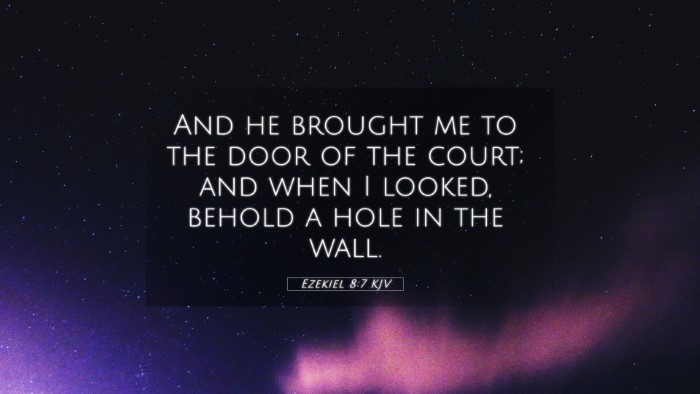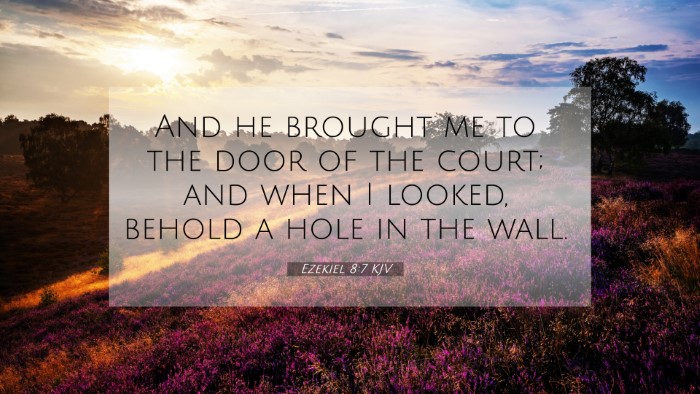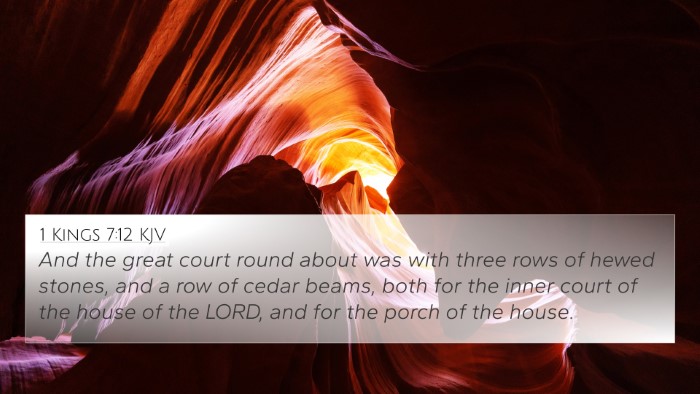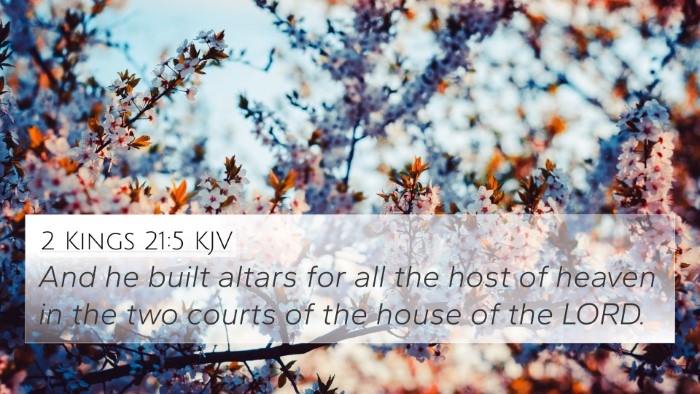Ezekiel 8:7 - Summary and Interpretation
The verse Ezekiel 8:7 states: “And he brought me to the door of the court; and when I looked, behold a hole in the wall.” This passage is part of a prophetic vision that reveals the corrupt practices occurring within the temple in Jerusalem during Ezekiel's time.
Context of the Verse
To understand the importance of this verse, one must grasp the overall context of Ezekiel’s prophecies. At this time, the children of Israel were deeply engaged in idolatry, turning their hearts away from God. Ezekiel’s visions serve as a divine critique of both the religious activities and the moral decay of the people.
Commentary Insights
-
Matthew Henry:
Henry highlights the significance of the "hole in the wall," suggesting it symbolizes the hidden sins and deceitfulness of the hearts of the people. This imagery illustrates how they had turned their attention away from the true worship of Yahweh and engaged in practices contrary to the covenant made with God.
-
Albert Barnes:
Barnes elaborates on the visual aspect of Ezekiel’s vision, emphasizing the need for the prophet to look deeper into the condition of the temple. The hole may also represent a breach in the integrity of the spiritual life of Israel and a call for reform and repentance.
-
Adam Clarke:
Clarke interprets this moment as a prophetic revelation where God exposes not just the physical structure of the temple but the underlying spiritual corruption. The act of bringing Ezekiel to the door signifies God's commitment to reveal truths that the people had chosen to ignore.
Thematic Connections
This verse connects with several significant themes in the Bible, showing the importance of maintaining holiness and the serious consequences of moral decay:
-
Idolatry and Worship: The issue of improper worship is woven throughout the scriptures, with cross-references such as Jeremiah 7:30-31 and Isaiah 1:13-14 highlighting similar concerns faced by the Israelites.
-
Spiritual Blindness: Verses like Matthew 15:14 emphasize the danger of ignoring God’s warnings and the consequences of spiritual blindness, much like the vision Ezekiel receives.
-
Divine Revelation: This theme is reflected in other prophetic texts, such as Amos 3:7, which asserts that God reveals His intentions to His prophets, bringing awareness of the people's sins.
-
The Need for Repentance: Ezekiel’s prophetic calls resonate with 2 Chronicles 7:14, which emphasizes turning to God for healing and restoration, reinforcing the importance of repentance amidst sin.
Cross-References for Further Study
For a deeper understanding of Ezekiel 8:7 and its themes, consider these cross-references:
- Jeremiah 2:13 - A warning against forsaking the fountain of living waters.
- Isaiah 29:13 - Addresses the hypocrisy in worship and the heart's distance from God.
- Hosea 5:15 - God speaks to Israel's apostasy, promising to return to His people once they seek Him.
- Mark 7:6-7 - Jesus quotes Isaiah, alerting to the emptiness of worship devoid of true heart connection.
- Ezekiel 14:6 - A call for Israel to turn away from their idols and return to the Lord.
- Revelation 9:20-21 - Highlights the hardness of hearts, paralleling Israel’s refusal to repent.
- Psalm 119:37 - A prayer for God to turn one’s eyes from worthless things, a plea for purity.
Conclusion
Ezekiel 8:7 serves not only as a historical reflection on the conditions of ancient Israel but also as a relevant message today about the importance of integrity in worship and the constant need for spiritual vigilance. By engaging with this scripture through thematic connections and cross-references, readers can enrich their understanding of how biblical principles interlink, enhancing personal study and spiritual growth.




